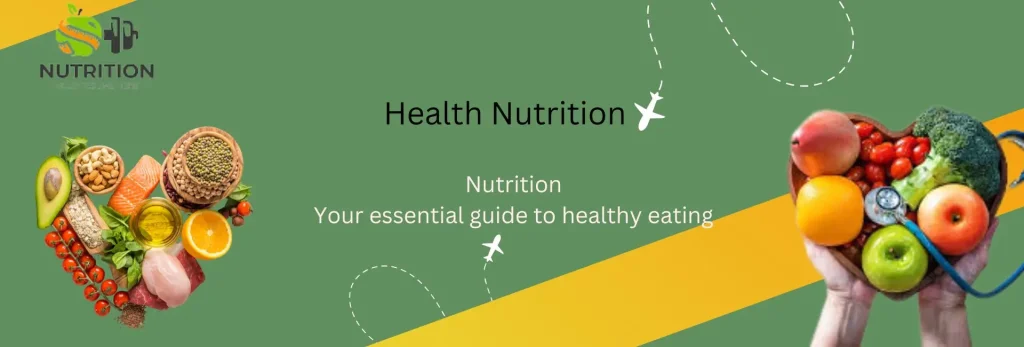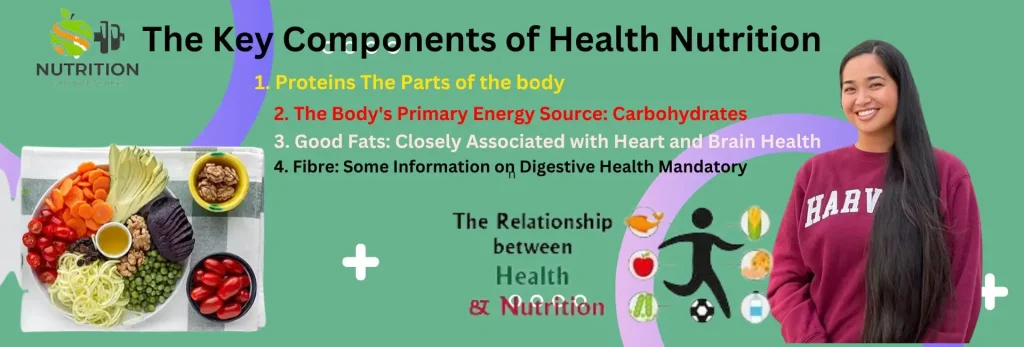
Comprehensive Guide to Health Nutrition: Key Factors for Optimal Well-Being
It’s a not secret that proper nutrition plays a significant role for the health of all people. A healthy eating plan makes sure that it avails to the body all the necessary nutrients for the support of growth, and production of energy among other uses in the body. They are needed in order to avoid an illness and heal it, to enhance the person’s armor, to extend one’s days, and to also increase one’s intellect. This wide reference work also comprehensively discusses the heath nutrition interventions, why it is central to our well being and how it can be used to persuadae people on the right diet.
Understanding Health Nutrition
Health nutrition is the scientific study of the foods that the body requires to replenish its nutrition for growth, recuperation and other basic physical functions. These nutrients include; proteins, carbohydrate, lipids, vitamins and minerals, fibre provision and water. Each vitamin is unique within the body and works on everything from the strengthening of bones to competency of the mind.
The two parts of nutrition are eating and choosing the correct types of food, knowing the outcomes and following dietary proportions. When people consume adequate portions of diverse every food type in the food bowl, then their body gets the nutrients it needs to grow.

The Key Components of Health Nutrition
In principle, all people should consider several aspects to be of high importance when it comes to balanced nutrition. All the nutrients are necessary to support normal body processes and achieve specific health goals.
1. Proteins The Parts of the body
These molecules that which are responsible for the tissues growth and repair are known as proteins and are deemed the building blocks of the organism. It has a role in structure and synthesis of hormonal and enzymic protein as well as other physiological products. It plays an important element in the immune system as well as muscle building.
Among the sources of protein are: • Animal: milk, beef, fish, poultry and eggs
• Plant-based: Quinoa, tofu, lentils, beans, nuts and seeds
Protein intake is so important, and therefore it is essential to choose a number of proteins with plant and animal origin. This ensures that the diet is rich in a host of amino acids, which are the units of proteins; they are the bodies’ substructures.
2. The Body’s Primary Energy Source: Carbohydrates
Carbohydrates are the main source of energy in the human body. Some of them are converted to glucose, or sugar which fuels the body and exercises. It is important to understanding the difference between complex carbohydrate and simple carbohydrate.
• Complex carbohydrates; the foods rich in these are whole grains, vegetables and pulses, provides sustained energy.
• Foods and beverages containing added sugars includes simple carbohydrates. While they may replenish you with energy in the shortest time possible, it is also mirrors to those foods that cause fluctuation in blood sugar levels.
Most of the complex carbohydrates and fibre come from the following whole grains, oats, brown rice and whole wheat bread.

3. Good Fats: Closely Associated with Heart and Brain Health
The synthesis of hormones, the heart, and the brain requires fats for build up. They help in the digestion of fat soluble vitamins such as the vitamins A, D E and K and are dense in energy.
Sources of healthy fat include:
• Monounsaturated fats: We include almonds, avocados and olive oil.
• Polyunsaturated fats: Ground nuts, flax seeds, and fish particularly the fatty types (salmon, sardines).
• Omega-3 fatty acids: crucial in fight against inflammation and boosting brain health
According to the USDA food pyramid, Trans fats found in processed snacks and baked products as well as saturated fats found in red meat, butter and full fat dairy should be avoided because they increase cholesterol levels and therefore the risk of heart.
4. Vitamins and Minerals: Circumstances Necessary in Order to Avoid Contagious Diseases
Vitamin and minerals play important role for different physiological processes in the body including metabolism, immunity and bone health etc. Each vitamin and mineral serves a specific purpose in maintaining health; hence, there is need to consume as many foods as possible.
Important minerals and vitamins include:
• Vitamin A: Good for skin, eyes and to support immunity – and can be found in spinach, sweet potatoes, and carrots.
• Vitamin C: Antioxidant, boosts collagen production, and enhances immune health found in bell peppers, broccoli, and oranges.
• Calcium: Strengthens teeth and bones , can be obtained from fortified soy milk or any plant-based milk, spinach, kale etc and any type of dairy products.
• Iron: Stimulation of synthesis of red blood cells, present in fortified cereals, spinachs, lentils and lean meats.
The body’s requirement of all essential vitamins and minerals is sufficiently met by a balanced diet of fruits, vegetables, whole grain, and protein foods.
5. Fibre: Some Information on Digestive Health Mandatory
That being the case, it is important to bear in mind that there is one kind of carbohydrate that the human body cannot break: fibre. It is very involved in digestion since it assists in causing bowel movement and prevents constipation and is useful in preventing several diseases for example diabetes and heart diseases.
Foods high in fibre include:
• Apples, pears, berries, • Broccoli, carrots, spinach, • Beans, lentils, • Whole grains that include oats, brown rice, quinoaamong foods to incorporate in ones diet to boost his or her intake of fiber rich foods.
That is, fibre helps individuals remain filled for a longer period; therefore, it is useful in weight loss.
6. Water: Life’s Elixir
This is among the most essential nutrient for the overall health of the body Water is that nutrient. It acts as a heater to the body, as-provides the cells of the human body with their functions and eliminates wastes from the body in form of urine. Sufficient amount of water to serve the adequate body functioning as far as digestion, skin and brains is required.
Water or H2O must be the main fluid with herbal teas and foods containing water part being used to cater for the necessity for water like water melon and cumber.
Health Nutrition and Disease Prevention
Diet With Regards to Health and Illness
To a certain extent, one of the factors that help avoid getting ill is proper diet. Foods directly affect our chances of getting certain diseases in this category, including diabetes, as well as heart disease and some cancers. Catalyst for change Most of these risks can be reduced with proper diet that is full of whole foods, antioxidants among other nutrients.
1. Health of the Heart
A canadian study also showed that the risk of heart disease can be reduced through taking fiber and antioxidants and other heart—healthy fats. Essential extra fatty acids such as omega 3 are found in fatty fish since they have the ability to avert cardiovascular diseases through decrease on cholesterol and inflammations in the body. Maintaining heart health also requires taking less of saturated fat and increase intake of fibre from fruits and vegetables.
2. Prevention of Diabetes
Reduced consumption of simple sweets, refined starches and sugars, coupled with increased intake of lean protein foods and vegetables and whole grains would prevent rise of dangerous blood sugar. Also improvements in sugar levels can be achieved through effective fibre diet such as vegetable and legume diets.
3. Preventing Cancer
Cancer can be beaten with the assistance of a nutritive diet, containing fruits, vegetables, whole grain products, and lean meats. Many fruits and vegetables especially the green leafy vegetables, raw cruciferous vegetables such as broccoli, cauliflower and berries contain compounds that have anti-inflammatory and antioxidant properties that may shed light on cancer risks.

Healthy Eating Habits for Optimal Nutrition
Picking out the right meals is however just half the battle when it comes to nutrition; the other half is building healthy eating habits for feeding the body. The following are some methods to help you eat better:
1. Consume a well-balanced diet
Ensure that the portion sizes of proteins, carbs, healthy fats, vitamins and mineral on your plates is appropriate. You should make sure that in the course of the day you take fruits and vegetables of different colors a bowl of healthy grains, a serving of lean meat and a source of unsaturated fats.
2. Finally, let the portion control idea go into practice.
Maybe it is important to try to control the portions in an attempt to avoid over eating and gaining weight. Avoid simply popping food into your mouth and consistently remember how much of each food group is recommended to consume. Some of the desirable strategies include, using smaller plates and focusing on the body signals that indicate that you are hungry.
3. Reduce The Intake Of Junk Foods
Closely processed foods are usually regarded as having desirable qualities of being high in sodium, bad fats and added sugar. These meals also cause various illnesses, inflammation and can lead to weight gain. If possible, always select meals that have not been processed at all.
4. Drink plenty of water
Drink a lot of water in one day so that the body is well hydrated. Hydration is important for increasing energy level, digestion and overall well-being. Avoid products with sugar and too much caffeine as these will make the body to lose its ability to produce fluids.
5. Make a Meal Plan
Meal planning also helps you make better choices because it ensures you always have wholesome foods available during the week. Other than eating unhealthy meals most of the times, another way which will help to reduce on the time wasted is to cook ahead of time.
Conclusion: The Importance of Health Nutrition
In addition to keeping healthy, avoiding constant diseases, healthy nutrition is very important. It is possible to have perfect health and live longer, and better lives through knowledge of nutrients and intelligent eating habits. The body will get all that it requires to operate optimally with the intake of whole foods, lean protein, and healthy fats plus appropriate nutrients and minerals.
The first task to be taken as part of the road to health improvement is informing oneself about proper nutrition and building the relevant healthy eating habits. For achieving good health and improved well-being, nutrition takes its rightful place in the priority list, and we are already on our way toward a better future.
Table of Contents